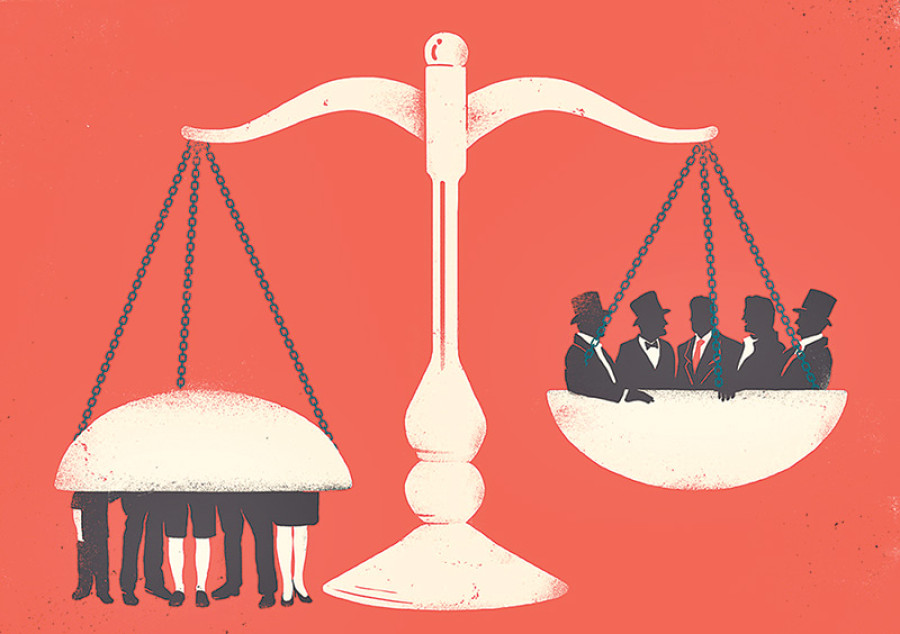Miscellaneous
Whose government is it anyway?
While Prime Minister Sher Bahadur Deuba was in the suites of India’s presidential palace, flood-hit people in Nepal’s plains did not have clean water to wash down the chiura and chauchau delivered by relief groups. Hungry children had no dry spot to sleep on.
Mohan Guragain
While Prime Minister Sher Bahadur Deuba was in the suites of India’s presidential palace, flood-hit people in Nepal’s plains did not have clean water to wash down the chiura and chauchau delivered by relief groups. Hungry children had no dry spot to sleep on. Farmers had lost their crop and cattle, their stock of food grains, however small, to inundation. Poor families had no sheets to shield winds piercing through the bared walls of their thatch.
Yet, the jumbo Nepali delegation was unable to extract substantial deals in New Delhi to address the perennial problem of flooding and inundation in Nepal. India’s policies, in part, cause some of the flooding in Nepal, given that the two countries share over a dozen major rivers. While much of Saptari in eastern Tarai was under water, Foreign Minister Krishna Bahadur Mahara had to place repeated requests with the external affairs minister of India to open the floodgates of the Koshi Barrage on the Nepal-India border, exposing the government’s lack of control over the country’s domestic affairs. Roads, dykes and dams built by India close to the international border in the south block drainage in times of heavy rains, causing water levels in the plains to swell over fields, animal sheds and homes.
The mention of flood management in bilateral statements seems to be lip service when there is no tangible follow-up action on the ground.
Nepal’s prime ministers have made it a practice to visit the Indian capital soon after taking office in Kathmandu as if to pay tribute to the Delhi Durbar. They are happy to dine and dash in Delhi and seek the blessings of the politicians there for the longevity of their governments that stand on shaky grounds of corruption, malpractices and factionalism back home. To showcase a false sense of achievement, they renew some of the old deals on roads and energy infrastructure, a majority of which never take off or complete on time.
Deuba followed the routine. But he did not raise the issue of banned Indian currency notes possessed by Nepalis for arrangements to replace them with legal tender. Nor was he able to get Indian officials to agree to gas bullets purchased by Nepali businesspeople ferrying LPG from Indian refineries to Nepal.
Why are successive Nepali governments so immune to people’s problems? Why does the citizens’ sorrow not move them? How can top officials and bureaucrats live in comfort when the common people are plagued by shortages? There is no royal government in Kathmandu any more, no dictator rules the country, most politicians appear to have of humble backgrounds. But why this utter neglect of helpless people when corrupt officials enjoy impunity? No major political party has spoken against the Nepal Oil Corporation purchasing land in different parts of the country paying several times higher the market rate. Is everyone involved in sharing the loot?
Dr Govinda KC has staged 11 hunger strikes with the same fundamental demands. There has been no serious opposition to his demands for reforms in the country’s health care and medical education. Yet, why do successive governments hesitate to implement the pacts reached with him? Why are the agreements breached repeatedly in the form of undeserved college affiliations and attempts to pass unfair laws?
Political parties may have different forms but they put on the same character of awarding contracts to their favourites and preventing action against persons in their camps for their plunders, thus creating grounds for corrupt regimes. Local governments have been elected for four months but the government has failed to depute civil servants there, crippling their activities. Has the time come when the government cannot mobilise the country’s bureaucracy? Is the tail wagging the dog?
How long will people have to suffer because of the inefficiencies of state agencies? How long must people bear the brunt of unfinished development works? The wealthy and powerful can avoid this with flights but students, wage workers and the poor are risking their lives every day to pass the landslide-prone Muglin-Narayanghat “cliffway” waiting hours for jams to clear. The road has suffered more due to the ongoing expansion works in one of the most challenging topographies.
Essential supplies in remote Hills are prohibitively costly due to breakdown in transport services as a result of rain-inflicted damage to roads when the festivals are around the corner. But there are no emergency measures. Responsible officials, untouched by people’s hardships, continue to enjoy themselves in their cocoons. In Kathmandu, the roads are as dusty and muddy as ever at the same time but both the local and central governments fail to fix them.
Worse, some in the government are hell bent on undoing the reforms initiated by their predecessors. For one, Education Minister Gopal Man Shrestha opened the old wound of temporary teachers’ mismanagement by promising them undeserved facilities. A recent amendment to the Education Act had provisioned a golden handshake for desiring teachers and permanent posting for those passing an internal competition. Minister Shrestha is now letting them have the cake and eat it too: sit for an exam for permanent job and walk away with retirement benefits even if you cannot pass it. The scheduled internal test of teachers has been stalled. This is going to worsen the state of public schooling in Nepal where a large majority of teachers avail themselves of lucrative pays and perks without having to do their primary duty. Lack of effective teaching and accountability has made public schools, save a few, only for those who have no means to send their children elsewhere. The minister’s move reverses the good initiative of hiring fresh and competent graduates to teach a vast majority of the country’s children. This is but one example.
Our politicians and officials are perceived to be corrupt in general. Lincoln defined democracy as the government of the people, by the people and for the people. In our democracy, we don’t know whose this government (the largest ever in the country’s history) is and for whom. v
The writer tweets @GuragainMohan




 9.7°C Kathmandu
9.7°C Kathmandu










